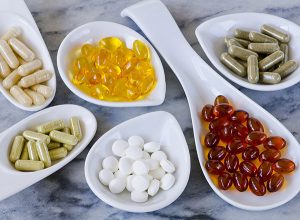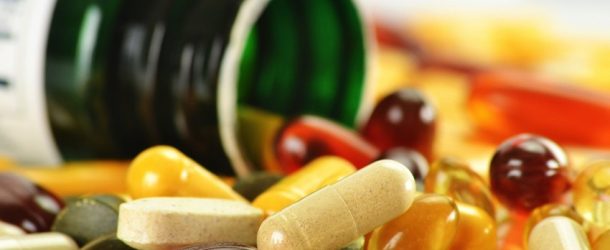 I’ve already answered almost all of the most asked questions that people on a vegan diet get: Where do you get your protein? What about calcium? What exactly do you eat? Another question I’m often asked is “You’re vegan? Do you take a lot of vitamins and supplements?”
I’ve already answered almost all of the most asked questions that people on a vegan diet get: Where do you get your protein? What about calcium? What exactly do you eat? Another question I’m often asked is “You’re vegan? Do you take a lot of vitamins and supplements?”
While there are a few supplements that I do take myself and recommend to my health coaching clients, vegans do not need to take fistfuls of pills to stay healthy. In fact I worry a little bit more about the nutrient intake of people who eat a diet that consists mainly of meat, cheese and bread than I do about my fellow vegans. Plant foods are full of vitamins, minerals, antioxidants and phytochemicals, so a diet full of vegetables, fruits, whole grains, beans, nuts, and seeds provides us with most of what our bodies need to be healthy. The key is to make sure you eat plenty of veggies (especially those green leafies), and eat a wide variety of foods. Chowing down on kale is great, but mix things up and try collard greens, bok choy and swiss chard.
So what supplements should we take? Here’s what I recommend:
Vitamin B12 – B12 is the one vitamin that vegans should supplement. B12 is kind of a strange nutrient, because it’s not really sourced from either plants or animals. B12 is the byproduct of bacteria. That’s right folks, it’s bacteria poop. B12 is found in soil, and since animals don’t live in the most sanitary of conditions, they ingest it when they eat. It’s thought humans’ need for B12 was genetic mutation because it was constantly in the food supply of early humans, who also didn’t live in the most sanitary of conditions.
B12 Stores in body for years and takes a long time for deficiency to show up, but once the deficiency is there, it’s there. A B12 deficiency can lead to pernicious anemia, a neurological disorder, which has no cure. Symptoms of a deficiency can include brain fog, low blood pressure, rapid heart rate, pale skin, shortness of breath, and numbness in fingers and toes. It’s not just vegans who need to supplement Vitamin B12 though – anyone over the age of 50 should take it regardless of their diet because absorption becomes more difficult as we age. Certain medications also interfere with B12 absorption, so it’s always good to research what you’re taking have your blood levels checked.
Vitamin D – Okay, it’s not really just vegans who need to supplement Vitamin D – it’s pretty much everyone. Like B12, Vitamin D is also a strange nutrient and it doesn’t come from food. It’s actually a hormone that is produced in the body after exposure to ultraviolet, natural sunlight. It’s needed for calcium absorption and building strong bones. Recent studies have also shown that vitamin D may help prevent certain types of cancer (especially breast and prostate), heart disease, strokes, autoimmune disorders & diabetes.
So if Vitamin D doesn’t come from food, how do we get it? About 15 to 20 minutes of direct sun exposure without sunscreen is enough for most people. The paler you are, the less sun exposure you need. However, in New Jersey and most of the northern half of the country, because of the where the sun is in the sky, it is impossible to get the proper ultraviolet rays in Autumn and Winter so supplementation is necessary. Most Americans are vitamin D deficient, so I usually recommend that all of my health coaching clients supplement it, not just vegans. The USDA recently raised their recommended dosage from is 400ius to 600, but for most people that still might not be enough. I usually suggest somewhere between 1,000 and 2,000, but it’s best to have your blood tested and to talk to your doctor about it before you raise your intake. By the way, Vitamin D2 is vegan and most forms of D3 aren’t.
Omega 3 Fatty Acids – Omega 3 fatty acids are what people take fish oil for, and like Vitamins D and B12, most Americans aren’t getting enough of it – not just vegans. Omega 3 fatty acids are important for body tissue functions, brain functions and a healthy immune system. Studies show that it helps to prevent cellular aging. It helps fight inflammation in the body and can help prevent heart disease, strokes, atherosclerosis, joint pain, menstrual problems, inflammatory conditions in the body. (Anything ending with “itis” such as colitis, arthritis, etc. is an inflammatory condition.) Deficiencies include skin problems, kidney and liver function problems, decreased immune system functions, and depression
So if you’re not eating fish or taking fish oil, where can you find omega 3 fatty acids? Good vegetarian sources are flax, chia, hemp, walnuts, soy beans & DHA supplements. DHA supplements are made from algae oil, and algae is actually where the fish get their “oil” from, so it makes sense to skip the middle man and get it directly from the source.
Everything Else – What about all of the other vitamins, minerals, and nutrients we need? Like I said, it’s possible to get just about everything we need from veggies, fruits, whole grains (and despite what the people who make those commercials would like you to believe, sugary flakes and cereal hoops are not whole grains), beans, nuts and seeds. While I know other people in the nutrition world might disagree with me, I believe in taking a good-quality multivitamin as kind of a backup for days when I might be eating a little less than healthfully.
Talk with your doctor and get your blood levels tested before starting any new supplements.
